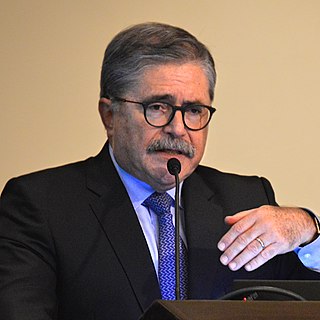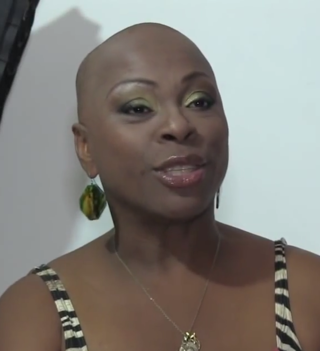Related Research Articles

The Legislative Assembly forms the unicameral legislative branch of the Costa Rican government. The national congress building is located in the capital city, San José, specifically in Carmen district of the San José canton.

Jorge Eduardo Arroyo-Pérez is a Costa Rican writer, playwright, opinion columnist, essayist, poet and theater director. He is currently Costa Rica's ambassador to UNESCO.

Christianity is the predominant religion in Costa Rica, with Catholicism being its largest denomination. Catholicism is also the state religion, but the government generally upholds people's religious freedom in practice.

General elections were held in Costa Rica on 26 July 1953. José Figueres Ferrer of the National Liberation Party won the presidential election, whilst his party also won the parliamentary election. Voter turnout was 67% in the presidential election and 68% in the parliamentary election. Local elections were also held.
Events in the year 2013 in Costa Rica.
Events in the year 2014 in Costa Rica.

General elections were held in Costa Rica on Sunday, 2 February 2014 to elect a new president, two vice presidents, and 57 Legislative Assembly lawmakers. In accordance with Article 132 of the constitution, incumbent President Laura Chinchilla Miranda was ineligible to run for a second consecutive term.

The National Restoration Party is a political party in Costa Rica. It was founded in 2005 by Carlos Avendaño Calvo mostly by dissidents of Costa Rica's historical Christian party, Costa Rican Renewal, after its then only deputy, Carlos Avendaño Calvo, left. Avendaño would successfully return to Congress because of the party from 2010 to 2014. Even though he had personal differences with Justo Orozco, both were able to work together in defending the same agenda, mainly the conservative views of the evangelical community. The party's candidate in the presidential election of 2014 was Avendaño, who received 1.35 percent of the vote.
Ruperto Marvin Atencio Delgado is a Costa Rican lawyer, health professional, and deputy.

Ana Rosa Chacón (1889–1985) was a Costa Rican educator, health education practitioner, feminist and suffragette. In 1953, in the first election held after women became enfranchised in Costa Rica, Chacón became one of the first three women elected to serve in public office.

Juan Diego Castro Fernández is a Costa Rican lawyer and politician, former Grand Master of the Grand Lodge of Costa Rica. Castro is a Defense lawyer who studied Law and Criminal science at the University of Costa Rica and has a Doctorate degree in Mediation from Universidad La Salle. Castro was Minister of Public Safety between 1994 and 1997 during the presidency of José María Figueres (PLN). He became the first cabinet member to receive a Motion of no confidence by the Legislative Assembly when he summoned police forces to fence off Parliament as a means to press for the reform of the Penal Code. Subsequently, Castro resigned as Minister of Safety and was named Minister of Justice. He unsuccessfully ran for the presidency as the nominee of the conservative-leaning National Integration Party in the 2018 Costa Rican general election. Castro has been compared unfavorably to US President Donald Trump and other right-wing antiestablishment and right-wing populist figures.
General elections were held in Costa Rica on 4 April 1886. After the death of Próspero Fernández Oreamuno in March 1885, Bernardo Soto Alfaro took over the presidency temporarily for the remainder of the term. Soto was a thirty-year-old young man who had to command the country in the war against Guatemala that sought to re-establish the Federal Republic of Central America. Soto was a freemason and liberal, belonging to "The Olympus", a group of liberal intellectuals who would have a great influence on Costa Rican politics and many would hold the Presidency of the Republic.
General elections were held in Costa Rica in 1894. Voters elected members of the electoral college on 4, 5 and 6 February, who in turn elected the president on 1 April.

The Reform State or Reformist State is a period in Costa Rican history characterized by a change in the political and economic paradigm. During this period, the country switched from the uncontrolled capitalism and laissez faire approach of the Liberal State into a more economically progressive Welfare State. The period ranges from approximately 1940, starting with the presidency of social reformer Rafael Angel Calderón Guardia, and ends around the 1980s with the neoliberal reforms inherent in the Washington Consensus that began after the government of Luis Alberto Monge.
Social Guarantees were a series of progressive political reforms made in Costa Rica in the 1940s for the benefit of the working classes. They came about as a result of the alliance between various political and religious figures. Though a widespreads effort, there were three main leaders:

The Article 98 of the Constitution of Costa Rica is the article that regulates free citizen association in political parties.
Antisemitism in Costa Rica refers to the anti-Jewish sentiment and prejudice in the Republic of Costa Rica.

Thelma Darkings Bucknam is a Costa Rican actress and television presenter. She is known for hosting the Costa Rican talk show programs Conectados and previously Entre nos. Her film credits include Noi siamo angeli (1997), Caribe (2004), and El último comandante (2010).

General elections were held in Costa Rica on 6 February 2022, to elect the president, two vice-presidents, and all 57 deputies of the Legislative Assembly. As none of the presidential nominees obtained at least 40% of the votes, a runoff was held on 3 April 2022, between the top two candidates, José María Figueres and Rodrigo Chaves Robles.

The Theosophical Society in Costa Rica was the local branch of the world Theosophical Society based in Adyar, India. It was founded on March 27, 1904 in the city of San José, and like Freemasonry in Costa Rica, it was the first in Central America, 1 it was introduced by the Spanish painter based in Costa Rica Tomás Povedano who began in Spanish theosophy. Its first lodge or branch was the Virya Branch, which published a magazine of the same name, currently it has four branches or lodges; Virya, Shakti Lodge, Dharma Lodge and HPB.
References
- ↑ Dobles, Aurelia Mitos de fundación y autoengaño Áncora, La Nación.
- ↑ Molina Jiménez, Iván. Elecciones y democracia en Costa Rica, 1885-1913. European Review of Latin American and Caribbean Studies. 70. 2001.
- 1 2 Urbina Gaitán, Chester Escritores salvadoreños y las características etnoculturales de los costarricenses Anuario de Estudios Centroamericanos, Universidad de Costa Rica, 40: 139-147, 2014 ISSN 0377-7316
- ↑ Agencia EFE (12 June 2015). "Celebran declaración constitucional de Costa Rica multiétnica y pluricultural" (in Spanish). Radio Columbia. Archived from the original on 26 June 2015.
- 1 2 Introvigne, Massimo (2006). "New Acropolis". In Clarke, Peter B. (ed.). Encyclopedia of new religious movements. London; New York: Routledge. pp. 441–442. ISBN 9-78-0-415-26707-6.
- ↑ Rodríguez Dobles, Esteban (December 2010 – April 2011). "Conflictos en torno a las representaciones sociales del alma y los milagros. La confrontación entre la Iglesia Católica y la Sociedad Teosófica en Costa Rica (1904-1917)". Revista de Estudios Históricos de la Masonería Latinoamericana y Caribeña. 2, Nº 2. ISSN 1659-4223.
- ↑ Acuña Ortega, Víctor Hugo. Mito de la la nación costarricense Áncora, La Nación.
- ↑ Rodríguez Vega, Eugenio. Costa Rica en el siglo veinte EUNED
- ↑ Hernández Naranjo, Gerardo. Reseña de las elecciones presidenciales de 1962. Universidad de Costa Rica
- ↑ Hernández Naranjo, Gerardo. Reseña de las elecciones presidenciales de 1974. Universidad de Costa Rica